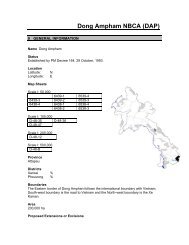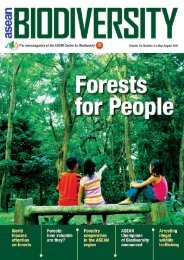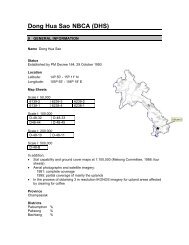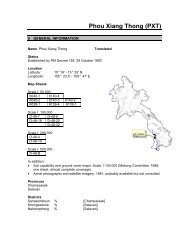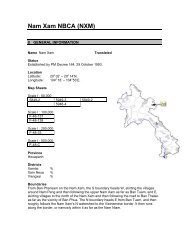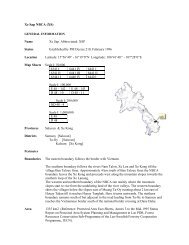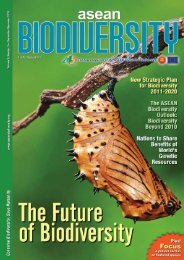Dr. Suseno Sukoyono Executive Chair - Coral Triangle Initiative on ...
Dr. Suseno Sukoyono Executive Chair - Coral Triangle Initiative on ...
Dr. Suseno Sukoyono Executive Chair - Coral Triangle Initiative on ...
You also want an ePaper? Increase the reach of your titles
YUMPU automatically turns print PDFs into web optimized ePapers that Google loves.
The CTI-CFF countries:Development partners:We are for the wold, what the world can offerThe <str<strong>on</strong>g>Coral</str<strong>on</strong>g> <str<strong>on</strong>g>Triangle</str<strong>on</strong>g> <str<strong>on</strong>g>Initiative</str<strong>on</strong>g> <strong>on</strong> <str<strong>on</strong>g>Coral</str<strong>on</strong>g> Reefs, Fisheries and Food Security:A Platform for Delivering <strong>on</strong> the Rio+20 UN C<strong>on</strong>ference <strong>on</strong>Sustainable Development Commitments<str<strong>on</strong>g>Dr</str<strong>on</strong>g>. <str<strong>on</strong>g>Suseno</str<strong>on</strong>g> <str<strong>on</strong>g>Sukoy<strong>on</strong>o</str<strong>on</strong>g><str<strong>on</strong>g>Executive</str<strong>on</strong>g> <str<strong>on</strong>g>Chair</str<strong>on</strong>g>Office of Interim-Regi<strong>on</strong>al Secretariatthe <str<strong>on</strong>g>Coral</str<strong>on</strong>g> <str<strong>on</strong>g>Triangle</str<strong>on</strong>g> <str<strong>on</strong>g>Initiative</str<strong>on</strong>g> <strong>on</strong> <str<strong>on</strong>g>Coral</str<strong>on</strong>g> Reefs, Fisheries, and Food Securityhttp://www.coraltriangleinitiative.org
Europe, North America and Asia. Healthy coral reef areas and associated species, including seaturtles and sharks, are a major nati<strong>on</strong>al and internati<strong>on</strong>al attracti<strong>on</strong> in a growing nature-basedtourism industry, generating billi<strong>on</strong>s of dollars annually. The regi<strong>on</strong> also holds incredible culturaldiversity. While there are over 2,000 languages spoken across these waters, all of these culturesshare a str<strong>on</strong>g and essential traditi<strong>on</strong>al c<strong>on</strong>necti<strong>on</strong> to the sea.The leaders of the six <str<strong>on</strong>g>Coral</str<strong>on</strong>g> <str<strong>on</strong>g>Triangle</str<strong>on</strong>g> countries recognized that the ec<strong>on</strong>omy, food security and thelivelihoods of the people living in the regi<strong>on</strong>, were under threat from a range of impacts <strong>on</strong> theoceans and coasts, including climate change, unsustainable fishing practices, polluti<strong>on</strong>, and oceanacidificati<strong>on</strong>. This provided the catalyst for the leaders to work together <strong>on</strong> a comm<strong>on</strong> platform forsustainable management of marine resources in the <str<strong>on</strong>g>Coral</str<strong>on</strong>g> <str<strong>on</strong>g>Triangle</str<strong>on</strong>g>. The CTI-CFF and its Regi<strong>on</strong>alPlan of Acti<strong>on</strong> together with the Nati<strong>on</strong>al Plans of Acti<strong>on</strong> for the six countries, provides an effectiveplatform for regi<strong>on</strong>al collaborati<strong>on</strong> and nati<strong>on</strong>al priority delivery of critical marine commitmentsmade through various multilateral envir<strong>on</strong>mental agreements including the UN C<strong>on</strong>venti<strong>on</strong> <strong>on</strong>Biological Diversity and the UN C<strong>on</strong>ference <strong>on</strong> Sustainable Development.Development partners including the Global Envir<strong>on</strong>ment Facility, Asian Development Bank, USAID,the Australian Government and Internati<strong>on</strong>al NGOs including WWF, C<strong>on</strong>servati<strong>on</strong> Internati<strong>on</strong>al andThe Nature C<strong>on</strong>servancy have also included in their own programmes, strategies enabling them tointeract in a regi<strong>on</strong>al manner and harness appropriate resources for this regi<strong>on</strong>al endeavour.The CTI member countries are currently focused <strong>on</strong> implementing regi<strong>on</strong>al priorities, andsimultaneously forging ahead with their nati<strong>on</strong>al priorities.CTI-CFF as a Mechanism for Delivering UNCSD Outcomes:On June 20-22, the “Rio+20” C<strong>on</strong>ference <strong>on</strong> Sustainable Development will be held in Rio de Janeiro,Brazil. It will be a significant global event in <strong>on</strong>going internati<strong>on</strong>al efforts to achieve sustainabledevelopment. The C<strong>on</strong>ference will focus <strong>on</strong> (a) a green ec<strong>on</strong>omy in the c<strong>on</strong>text of sustainabledevelopment poverty eradicati<strong>on</strong>; and (b) the instituti<strong>on</strong>al framework for sustainabledevelopment with seven areas of priority attenti<strong>on</strong> such as decent jobs, energy, sustainable cities,food security and sustainable agriculture, water, oceans and disaster readiness. As awareness ofthese issues has increased in the last decades, governments in the <str<strong>on</strong>g>Coral</str<strong>on</strong>g> <str<strong>on</strong>g>Triangle</str<strong>on</strong>g> regi<strong>on</strong> haveestablished a set of new multilateral cooperati<strong>on</strong> mechanisms focused more sharply <strong>on</strong> marineand coastal resources. The <str<strong>on</strong>g>Coral</str<strong>on</strong>g> <str<strong>on</strong>g>Triangle</str<strong>on</strong>g> <str<strong>on</strong>g>Initiative</str<strong>on</strong>g> <strong>on</strong> <str<strong>on</strong>g>Coral</str<strong>on</strong>g> Reefs, Fisheries and Food Security (CTI-CFF) was launched in May 2009 with an ambitious and visi<strong>on</strong>ary 10-year Regi<strong>on</strong>al Plan of Acti<strong>on</strong>(RPOA) to safeguard the regi<strong>on</strong>’s marine and coastal biological resources.As commitments in the RPOA are implemented through nati<strong>on</strong>al level acti<strong>on</strong> plans and regi<strong>on</strong>alcollaborati<strong>on</strong>, <str<strong>on</strong>g>Coral</str<strong>on</strong>g> <str<strong>on</strong>g>Triangle</str<strong>on</strong>g> countries and their development partners anticipate achievingtangible and measurable improvements in the health of the regi<strong>on</strong>’s marine and coastalecosystems, in the status of its fisheries, and in the food security and well-being of thecommunities which depend <strong>on</strong> them. The marine and coastal ecosystems of the regi<strong>on</strong> providesignificant actual and potential ec<strong>on</strong>omic benefits to the over 360 milli<strong>on</strong> people in the regi<strong>on</strong>, andthe milli<strong>on</strong>s who live outside the regi<strong>on</strong> but rely <strong>on</strong> the benefits from the marine resources from the<str<strong>on</strong>g>Coral</str<strong>on</strong>g> <str<strong>on</strong>g>Triangle</str<strong>on</strong>g>.As a result of the current negotiati<strong>on</strong>s by UNCSD Parties in the lead up to Rio+20 in June, there are anumber of important priorities which reflect key thematic acti<strong>on</strong>s and commitments which will bethe focus <strong>on</strong> negotiati<strong>on</strong>s around oceans and coastal marine resource governance. Theinternati<strong>on</strong>al community has emphasised the important links between sustainable ec<strong>on</strong>omic growth,
poverty eradicati<strong>on</strong>, food security and sustainable livelihoods, while at the same time protectingbiodiversity and the marine envir<strong>on</strong>ment, and adapting to climate change.These important linkages between healthy oceans and coasts with sustainable ec<strong>on</strong>omic development,poverty eradicati<strong>on</strong>, food security and sustainable livelihoods, have also been recognized in the CTI-CFF.Therefore, strategically, the CTI-CFF has developed goals and regi<strong>on</strong>al priority acti<strong>on</strong>s aimed ataddressing the major threats to the <str<strong>on</strong>g>Coral</str<strong>on</strong>g> <str<strong>on</strong>g>Triangle</str<strong>on</strong>g>’s marine biodiversity and resources many of whichare comm<strong>on</strong> threats faced around the globe. The strategies developed to achieve the <str<strong>on</strong>g>Coral</str<strong>on</strong>g> <str<strong>on</strong>g>Triangle</str<strong>on</strong>g><str<strong>on</strong>g>Initiative</str<strong>on</strong>g> objectives are also dem<strong>on</strong>stratively effective acti<strong>on</strong>s which are helping to achieve Riocommitments made 20 years ago and are strategically placed to deliver <strong>on</strong> new emerging priorities inthe lead up to Rio+20. The following secti<strong>on</strong> identifies some of these emerging priorities for the Rio+20C<strong>on</strong>ference <strong>on</strong> Sustainable Development and the strategies employed through the CTI-CFF which arealready being developed or implemented and will help to address those priorities.Rio+20 Emerging Priorities and the CTI –CFF Strategies1. Rio +20 Emerging Priorities: Support internati<strong>on</strong>al cooperati<strong>on</strong> and frameworks directed at bothc<strong>on</strong>serving and realizing the social and ec<strong>on</strong>omic benefits of coral reefs, such as the <str<strong>on</strong>g>Coral</str<strong>on</strong>g><str<strong>on</strong>g>Triangle</str<strong>on</strong>g> <str<strong>on</strong>g>Initiative</str<strong>on</strong>g>.CTI-CFF Strategies:In 2009, the Governments of Ind<strong>on</strong>esia, Malaysia, Philippines, Solom<strong>on</strong> Islands, PapuaNew Guinea and Timor Leste launched the <str<strong>on</strong>g>Coral</str<strong>on</strong>g> <str<strong>on</strong>g>Triangle</str<strong>on</strong>g> <str<strong>on</strong>g>Initiative</str<strong>on</strong>g> <strong>on</strong> <str<strong>on</strong>g>Coral</str<strong>on</strong>g> Reefs,Fisheries and Food Security and endorsed a Regi<strong>on</strong>al Plan of Acti<strong>on</strong> to c<strong>on</strong>serve andsustainably manage coastal and marine resources within the <str<strong>on</strong>g>Coral</str<strong>on</strong>g> <str<strong>on</strong>g>Triangle</str<strong>on</strong>g> regi<strong>on</strong>. Eachof the nati<strong>on</strong>al governments has developed corresp<strong>on</strong>ding Nati<strong>on</strong>al Plans of Acti<strong>on</strong>towards achieving the goals of the CTI-CFF and deliver nati<strong>on</strong>al priorities.Agreed to the establishment of a permanent CT Regi<strong>on</strong>al Secretariat to be hosted inInd<strong>on</strong>esia.Established a CT Financial Resources Working Group which is developing aFinancial Resources Strategy to support investment in the implementati<strong>on</strong>of the Regi<strong>on</strong>al and Nati<strong>on</strong>al Plans of Acti<strong>on</strong>.Secured approximately 400 milli<strong>on</strong> USD in investment from developmentpartners including the US and Australian governments, Asian Development Bank,Global Envir<strong>on</strong>ment Facility and c<strong>on</strong>sortium of NGO partners WWF, CI and TNC.2. Rio +20 Emerging Priorities: Maintain the productivity and biodiversity of marine and coastalecosystems; and c<strong>on</strong>servati<strong>on</strong>, sustainable management and equitable sharing of marine andocean resources.CTI-CFF Strategies:Establishing priority seascapes as a focus for cooperative management of coastal andmarine resources and for targeted investments in sustainable management of theseareas. Priority seascapes help guide internati<strong>on</strong>al and domestic funding, theestablishment of effective partnerships and for guiding governmental policy acti<strong>on</strong>s.
A Seascapes Model Guide Book <strong>on</strong> “How to Select, Develop and Implement Seascapes"has been drafted by with support for the US and C<strong>on</strong>servati<strong>on</strong> Internati<strong>on</strong>al.The Sulu Sulawesi Marine Ecoregi<strong>on</strong> and the Arafura Timor Sea Marine Ecoregi<strong>on</strong> aretwo priority seascapes for the focus of nati<strong>on</strong>al and regi<strong>on</strong>al level acti<strong>on</strong>s. Sustainablefinancing scoping studies of the SSME MPAs have been completed for Malaysia andInd<strong>on</strong>esia with the Philippines comp<strong>on</strong>ent to be undertaken in FY12 with the assistanceof WWF.Malaysia is largely focusing its CTI NPOA <strong>on</strong> implementati<strong>on</strong> in Sabah as part of theSSME Seascape.Improving the status of threatened species such as sharks, sea turtles, seabirds,marine mammals, corals, seagrasses, mangroves and other identifiedthreatened species through measures such as developing and implementingregi<strong>on</strong>-wide c<strong>on</strong>servati<strong>on</strong> acti<strong>on</strong> plans, protecting critical habitats, addressinginternati<strong>on</strong>al trade impacts and reducing by-catch related to commercial fishingoperati<strong>on</strong>s.PNG has nominated Kimbe Bay as a high priority and pilot dem<strong>on</strong>strati<strong>on</strong> site, and isapplying acti<strong>on</strong>s from 4 of the 5 CTI goals, already completing a series of c<strong>on</strong>sultati<strong>on</strong>workshops with provincial and local governments, social mapping exercises and habitat(catchment) mapping. These activities will be replicated in Manus province.3. Rio +20 Emerging Priorities: A holistic and integrated approach to the governance of oceans,seas and coasts through the use of the precauti<strong>on</strong>ary approach and the ecosystem approach asguiding principles and the development of cross-sectoral policy tools and approaches such asIntegrated Coastal Z<strong>on</strong>e Management .CTI-CFF Strategies:The CT 6 countries prioritised applying the Ecosystem Approach to Management ofFisheries (EAFM) and to other marine resources by collaborating to develop acomm<strong>on</strong> regi<strong>on</strong>al framework for legislati<strong>on</strong> and policy that would support EAFM.An EAFM Legislative and Policy Framework is being developed and regi<strong>on</strong>al exchanges havebeen c<strong>on</strong>ducted for shared learning and capacity building for Local Government and FisheriesManagement agencies <strong>on</strong> EAFM.SEAFDEC, FAO, US/NOAA are collaborating to develop an EAFM training program andcurriculum.On the nati<strong>on</strong>al level nati<strong>on</strong>al governments are taking steps to incorporate EAFM in fisheriesprogrammes and legislati<strong>on</strong>. Ind<strong>on</strong>esia has passed several new regulati<strong>on</strong>s and FisheriesManagement Plans are being developed applying EAFM. A moratorium <strong>on</strong> certain gears islikely to be set in place, a new multi-stakeholder forum to support EAFM in 11 fisheriesmanagement areas, and a set of indicators for EAFM.In the Philippines, EAFM principles are being applied in the Live Reef Food Fish Trade industryin Palawan, with local government investing in management and enforcement.
Timor-Leste has adopted the LMMA (Locally Managed Marine Area) approach and programin order to integrate traditi<strong>on</strong>al knowledge and management and empowering localcommunities to manage their own resources and for applying EAFM in its seascapes andmarine managed areas.4. Rio +20 Emerging Priorities: Maintain or restore depleted fish stocks, reduce over fishing andeliminate destructive as well as harmful fishing practicesCTI-CFF Strategies:Building sustainable fisheries and encouraging resp<strong>on</strong>sible regi<strong>on</strong>al governance ofkey commercial species such as tuna and live reef food fish.In 2010 Malaysia hosted representatives from the six CT countries plus experts and partnersto define regi<strong>on</strong>al-level collective acti<strong>on</strong>s for achieving more effective management and amore sustainable trade in live-reef food fish in the <str<strong>on</strong>g>Coral</str<strong>on</strong>g> <str<strong>on</strong>g>Triangle</str<strong>on</strong>g>. Key messages from theworkshop were then delivered to an APEC Workshop <strong>on</strong> the Live Reef Food Fish Trade.Work is underway to scope the development of a CTI multi-stakeholder forum with the aim ofimproving the sustainability of the Live Reef Food Fish Trade. The forum will provide a venuefor agreement <strong>on</strong> issues and impacts of the Live Reef Food Fish Trade and for developingcollaborative soluti<strong>on</strong>s. It will provide a collective voice for interacti<strong>on</strong>s between CT6producer countries and market countries and the n<strong>on</strong>-CT private sector.Ind<strong>on</strong>esia has taken steps to improve sustainable livelihoods related to fisheries. Thisincludes creating revolving fund schemes and several livelihood programs for developingintegrated coastal villages to achieve sustainable fisheries, developed restocking programs(“One Man-One Thousand Fries Program”) and is developing certificati<strong>on</strong> and best practices.In relati<strong>on</strong> to tuna stocks and sustainability, Ind<strong>on</strong>esia has initiated activities involvingtagging, a cold-chain system, and m<strong>on</strong>itoring and also has a focus <strong>on</strong> enhancing sustainableLive Reef Food Fish and ornamentals trade. It is finalizing and implementing a managementplan for the Banggai Cardinal Fish, and is working <strong>on</strong> data bases for these fisheries anddeveloping a strategic plan for the LRFT.5. Rio +20 Emerging Priorities: Combat illegal, unreported and unregulated (IUU) fishing byadopting and implementing effective tools, in accordance with internati<strong>on</strong>al law;CTI-CFF Strategies:Improve enforcement of Illegal, Unregulated and Unreported (IUU) fishing through greatercollaborati<strong>on</strong> between the <str<strong>on</strong>g>Coral</str<strong>on</strong>g> <str<strong>on</strong>g>Triangle</str<strong>on</strong>g> countries.NOAA is supporting the CT6 to build capacity for collaborati<strong>on</strong> <strong>on</strong> improved enforcementagainst IUU fishing. In-country and internati<strong>on</strong>al training and c<strong>on</strong>sultati<strong>on</strong>s have beenc<strong>on</strong>ducted and a review of the status of legal frameworks and capacity for M<strong>on</strong>itoring,C<strong>on</strong>trol and Surveillance has been completed and priority needs identifiedInd<strong>on</strong>esia has enacted legislati<strong>on</strong> to combat illegal, unreported and unregulated (IUU)fishing.
6. Rio +20 Emerging Priorities: Improve transparency and accountability in fisheries managementby regi<strong>on</strong>al fisheries management organizati<strong>on</strong>s.CTI-CFF Strategies:Creati<strong>on</strong> of the <str<strong>on</strong>g>Coral</str<strong>on</strong>g> <str<strong>on</strong>g>Triangle</str<strong>on</strong>g> Fishers Forum (CTFF), which brings together representativesfrom the fisheries sector ranging from community fishers to industrial scale fisheries,marketers and retailers. The CTFF is a potential vehicle for inputting policy recommendati<strong>on</strong>s<strong>on</strong> governance and management measures to the Indian Ocean and Western and CentralPacific Regi<strong>on</strong>al Fisheries Management Organizati<strong>on</strong>s.7. Rio +20 Emerging Priorities: Create representative and resilient networks of Marine ProtectedAreas that protect and enhance biodiversity and are based <strong>on</strong> the best available scientificinformati<strong>on</strong>.CTI-CFF Strategies:Establishing and managing a regi<strong>on</strong>al MPA network of prioritized individual MPAs andnetworks of MPAs that are c<strong>on</strong>nected, resilient, sustainably financed, and designed togenerate income, sustain livelihoods, and provide food security benefits for coastalcommunities while c<strong>on</strong>serving biological diversity.A framework and objectives for a CTI Marine Protected Area Network based <strong>on</strong> comm<strong>on</strong>principles is being developed.The <str<strong>on</strong>g>Coral</str<strong>on</strong>g> <str<strong>on</strong>g>Triangle</str<strong>on</strong>g> Atlas (www.reefbase.org) has been developed as an informati<strong>on</strong> systemto track MPAs in the regi<strong>on</strong>.Capacity building and training has been undertaken to increase MPA ManagementEffectivenessTimor Leste has established an MPA within Nino K<strong>on</strong>is Santana Nati<strong>on</strong>al Park based <strong>on</strong>government and traditi<strong>on</strong>al law.In the Philippines, MPA achievements include: Creati<strong>on</strong> of Enforcement Network in Batangasand Mindoro provinces and which are supported through agreements, including 12municipalities with 33 MPAS in Batangas and 8 municipalities with 15 MPAs in OrientalMindoro. In Verde Passage, mangroves have been rehabilitated and a SMART (Climate-Sustainably Managed Adaptive Resilient and Retargeted) MPA Network established with1150 hectares, with a larger area (12255 ha) as a no-take z<strong>on</strong>e or “fishery reserve”. A toolfor assessing MPA management effectiveness was developed and is being tested, with a newMPA around Tubbataha Reefs established.Solom<strong>on</strong> Islands has developed a model for Community Based Resource Management and islooking to begin implementati<strong>on</strong> in the latter part of 2012 as a means for co-management ofcoastal and marine resources including inshore fisheries.8. Rio +20 Emerging Priorities: Improve understanding of climate change impacts, including oceanacidificati<strong>on</strong>, <strong>on</strong> marine and coastal ecosystems and to build their resilience to these impacts.
The private sector, a critical stakeholder and partner in the sustainable management, use andprotecti<strong>on</strong> of oceans, coasts and marine resources, are now an integral part of the CTI-CFF. Industryengagement first became a major focus in 2010 through two CTI events - the CTI Business Forumand the <str<strong>on</strong>g>Coral</str<strong>on</strong>g> <str<strong>on</strong>g>Triangle</str<strong>on</strong>g> Fishers Forum. These events have resulted in significant commitments fromthe business sector and nati<strong>on</strong>al governments to improving business practices and governancepolicies aimed at improving sustainability of fish stocks and the fishing industry in a number of <str<strong>on</strong>g>Coral</str<strong>on</strong>g><str<strong>on</strong>g>Triangle</str<strong>on</strong>g> countries. In 2011, the CTI countries moved towards establishing a <str<strong>on</strong>g>Coral</str<strong>on</strong>g> <str<strong>on</strong>g>Triangle</str<strong>on</strong>g> BusinessCouncil which will provide a mechanism for direct engagement with key industry sectors for policyadvice, informati<strong>on</strong> sharing and collaborati<strong>on</strong> <strong>on</strong> sustainable business practices.Government processes developed in past years, are ready now for supporting various roles forregi<strong>on</strong>al collaborati<strong>on</strong>. The six <str<strong>on</strong>g>Coral</str<strong>on</strong>g> <str<strong>on</strong>g>Triangle</str<strong>on</strong>g> countries are already exchanging less<strong>on</strong>s andapproaches, building capacity of government agencies, NGOs, coastal communities and the fishingsector for improved marine resource management. They are already collaborating for c<strong>on</strong>servati<strong>on</strong>priority setting <strong>on</strong> Climate Change Adaptati<strong>on</strong>, Ecosystem Approaches to Fisheries Management, forSeascapes and Marine Protected and Marine Managed Areas. New platforms are being developedfor <str<strong>on</strong>g>Coral</str<strong>on</strong>g> <str<strong>on</strong>g>Triangle</str<strong>on</strong>g> communicati<strong>on</strong>s and promoti<strong>on</strong>, knowledge management and sharing, andsustainable financing.For further detail please c<strong>on</strong>tact:<str<strong>on</strong>g>Dr</str<strong>on</strong>g>. DarmawanCoordinatorE-mail: darmawan@indo.net.idPermana YudiarsoAssistant CoordinatorE-mail: permana.yudiarso@gmail.comOffice of Interim-Regi<strong>on</strong>al Secretariat the <str<strong>on</strong>g>Coral</str<strong>on</strong>g> <str<strong>on</strong>g>Triangle</str<strong>on</strong>g> <str<strong>on</strong>g>Initiative</str<strong>on</strong>g> <strong>on</strong> <str<strong>on</strong>g>Coral</str<strong>on</strong>g> Reefs, Fisheries, and FoodSecurity (the CTI-CFF)Mina Bahari 2 Building Floor 17 th , Jl. Medan Merdeka Timur No. 16 Jakarta Pusat 10110Ph<strong>on</strong>e: +62 21 3521780, Fax: +62 21 3522515Website: http://www.coraltriangleinitiative.orgAcknowledgement:This paper was prepared by CTI-CFF development partners and the Interim-Regi<strong>on</strong>al Secretariat.



